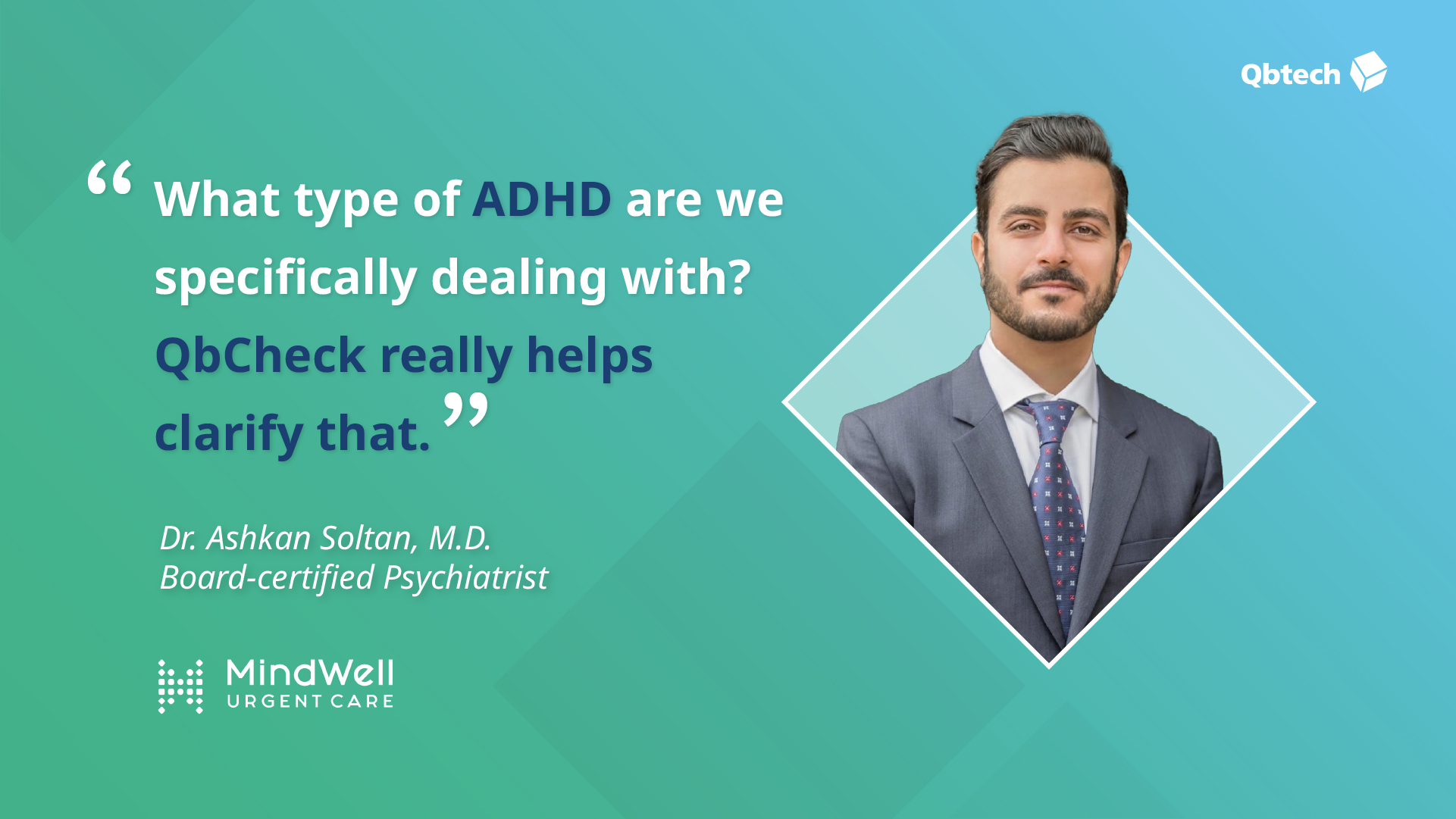Technology has a growing role in ADHD care, particularly in hybrid clinics where telehealth is used to help tackle wait times and expand access to underserved areas. However, the clinician remains at the core of ADHD diagnosis and treatment. This case study explores how technology can assist clinicians in diagnostic decision-making and empower them with additional data.
We spoke with Dr. Ashkan Soltan, M.D., a double board-certified child/adolescent and adult psychiatrist at MindWell Urgent Care.
His practice combines modern ADHD testing, utilizing technologies like QbCheck with individualized care, comprising of comprehensive clinical interviews with patients and their families. ADHD care is delivered via a hybrid model, with testing and follow-up appointments in-clinic and over telehealth.
Inside the ADHD testing pathway
Q. What does an ADHD pathway look like in your hybrid clinic?
A: We follow a data-driven approach. ADHD assessments typically start with an hour-long initial evaluation where we talk about clinical history and follow that up with one or two further appointments, usually lasting 30 to 60 minutes each.
We adopt a comprehensive approach to ADHD diagnosis, looking at academic performance, behaviors in childhood and adulthood, and parent and teacher evaluations for pediatric patients. We also use imaging techniques like an EEG, which looks at different brain patterns during tasks that require a lot of mental effort. The objective ADHD test we use, QbCheck, looks at hyperactivity, impulsivity, and attention levels.

How technology supports ADHD diagnosis and treatment
Q. How does technology help in working with ADHD patients?
A: Technology doesn’t replace clinicians, but it can help them with assessing ADHD. I love the new tools and things that are available to us because it only makes me more confident in the clinical hypothesis that I have and adds data for us. Ultimately, the clinical interview from an experienced clinician is the gold standard of making any psychiatric diagnosis.
Q. How does a digital ADHD test help with patient education?
A: When you look at the test results and break down the attention score, the impulsivity score, and the hyperactivity score, you can see they're different things and not everybody has problems in each and every area.
The digital ADHD test helps to narrow things down, so if we solve problems with focus and attention, but we're not really seeing evidence of hyperactivity or fidgetiness that the patient has talked about, we can ask where exactly that is happening. It could be related to something like anxiety, if it's only happening at work versus at home.
Why an objective assessment matters
Q. What are the risks of diagnosing ADHD without a thorough assessment process?
A: I'd say the biggest risk is misdiagnosis. ADHD can look like a whole lot of different things. If you have an anxious child that's not paying attention, you could treat their ADHD, but if you're not dealing with the anxiety, then they're really not going to improve.
You also see a type of ‘checklist diagnosis’ process now. These typically use a short questionnaire, and if you check off 10 out of 15 items, you receive a diagnosis of ADHD. However, it's not appropriate, and I think it leads to real problems down the line.
This can include treating patients for ADHD when perhaps a comorbid condition is responsible for the checklist answers provided.
Q. Can technology and ADHD testing tools help with ADHD medication titration?
A: Our motto is start low and go slow, and then slowly kind of titrate that up till we get to a point of symptom remission, which means most symptoms are either gone or they've been minimal.
After six months to a year, we repeat those initial ADHD tests with the patient on medication and look at the difference in functioning. One of the tests that is repeated is QbCheck.
If patients say things are going well, that they're better able to focus, or pay attention again - we want to correlate that with an objective report.
The QbCheck retest can also highlight when a comorbid condition may be complicating treatment. If somebody tells me that they feel great, but the test comes back pretty elevated, I'm questioning if there is something else potentially going on, like an anxiety disorder or another comorbidity.
About MindWell Urgent Care
MindWell Urgent Care provides support to patients in-clinic in Dallas, Texas, but also online via telehealth across Texas, Oklahoma, New Jersey, Florida, and Kansas. Offering hybrid ADHD services via telehealth helps people access care, even when they’re not located near a clinic. Telehealth appointments also help speed up patient access to care, without the wait for an in-clinic appointment.
